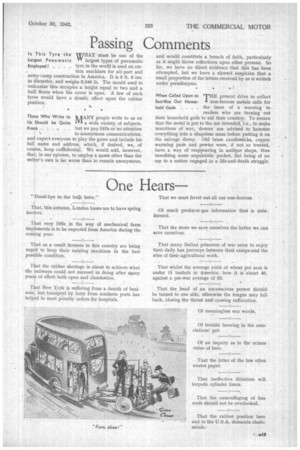One Hears
Page 19

If you've noticed an error in this article please click here to report it so we can fix it.
" Good-bye to the bulb horn."
That, this autumn, London buses are to have spring hooters.
That very little in the way of mechanical farm implements is to be expected from America during the coming year.
That as a result farmers in this country are being urged to keep their existing machines in the best possible condition.
That the rubber shortage is about to achieve what tile railways could not succeed in doing after many years of effort both open and clandestine.
That New York is suffering from a dearth of business, but transport by lorry from southern ports has helped to meet priority orders for hospitals. That we must ferret out all our non-ferrous.
Of much producer-gas information thai is uninformed.
That the more we save ourselves the better we can save ourselves.
That many Italian prisoners of war seem to enjoy their daily bus journeys between their camps and the sites of their agricultural work.
That whilst the average yield of wheat per acre is under 15 bushels in America, here it is about 40, against a pre-war average of 33.
That the head of an unconscious person should be turned to one side, otherwise the tongue may fall back, closing the throat and causing suffocation.
Of meaningless war words.
Of trouble brewing_ in the associations' pot.
Of an inquiry as to the octane value of beer.
That the letter of the law often wastes paper.
That ineffective filtration will torpedo cylinder liners.
That the camouflaging of bus roofs should not be overlooked.
That the rubber position here and in the U.S.A. demands elastic minds.




















































